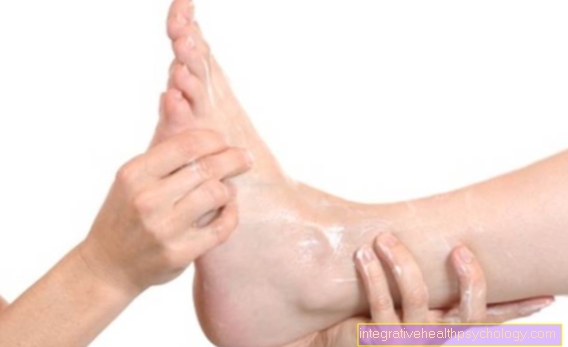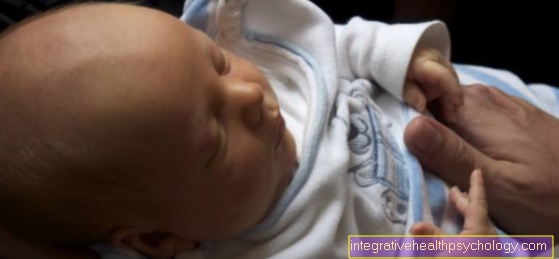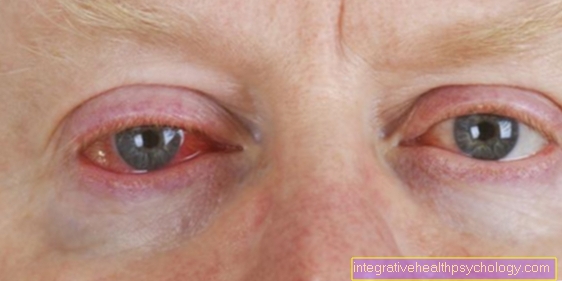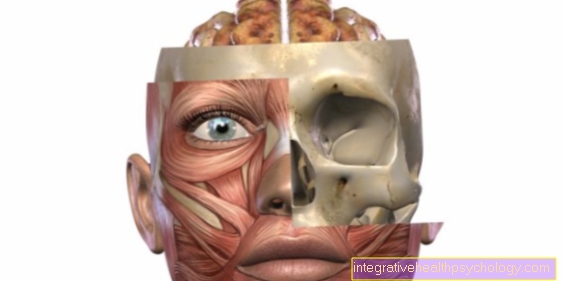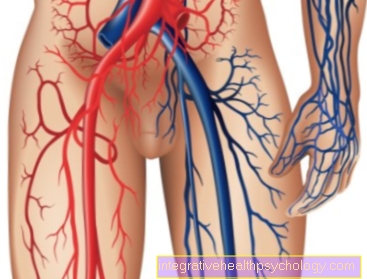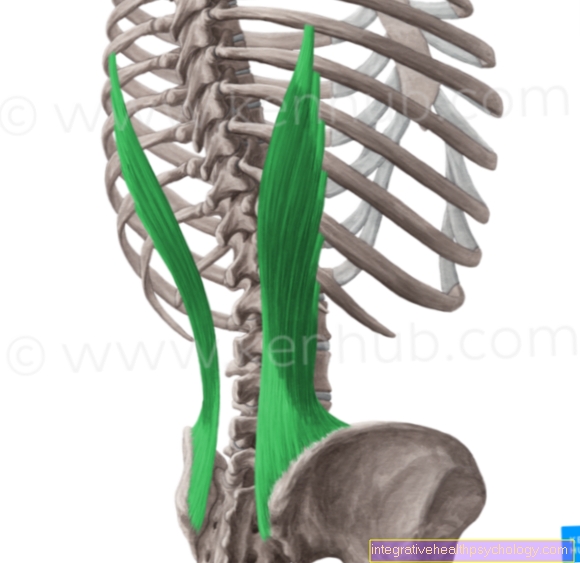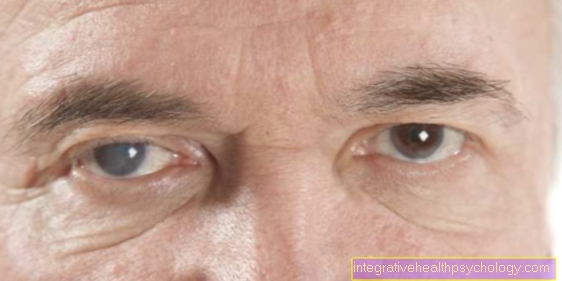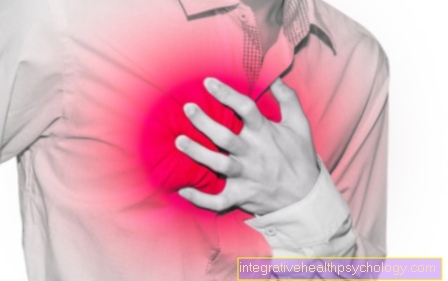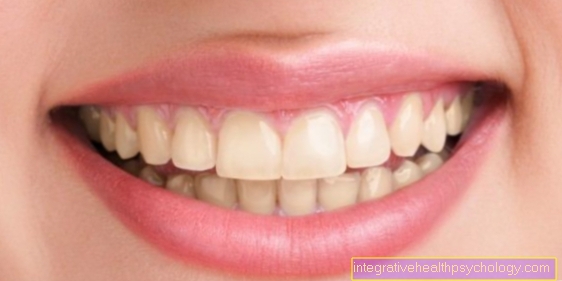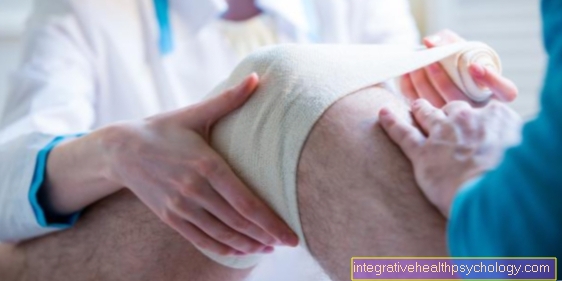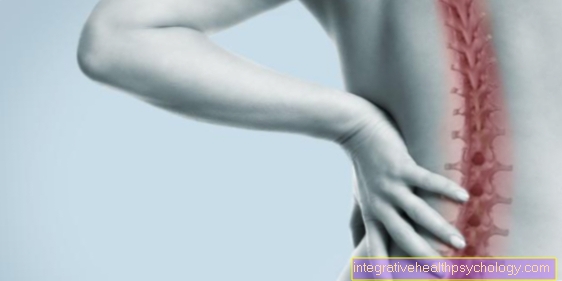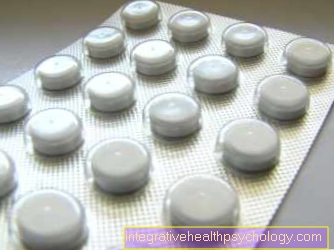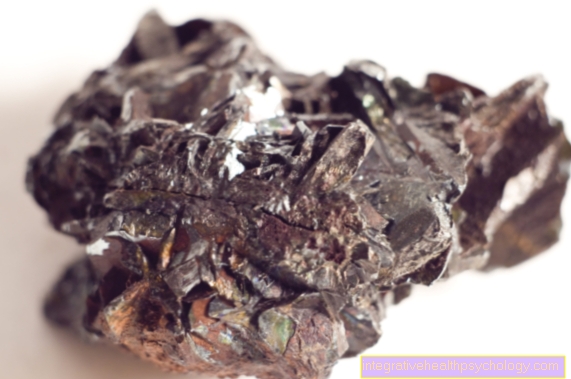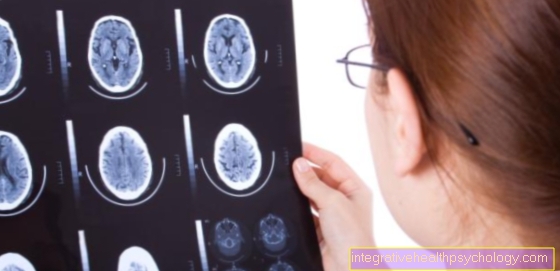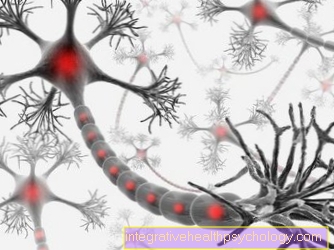Racing heart (tachycardia)
Synonyms in the broadest sense
Tachycardia, rapid heartbeat, paroxymal supraventricular tachycardia, AV node reentry tachycardia, abnormally fast heartbeat, Wolff-Parkinson-White (WPW) syndrome.
Paroxysmal supraventricular tachycardias
The term describes a whole group of different cardiac arrhythmias. Together they are inappropriately faster Pulse of more than 100 beats per minute and an origin of the Rhythm disturbance above the ventricles. It mostly affects younger patients, women more often than men.
.jpg)
AV nodal reentry tachycardia
Seizure-like supraventricular tachycardias (i.e. accelerated heart rates emanating from the atrium); the place of origin is the AV node. Triggers can be additional (atrioventricular) conduction pathways (also called Kent bundles) extending from the atrium to the ventricle. In addition to several rarer forms, the most common representative of AV node reentry tachycardia is Wolff-Parkinson-White (WPW) syndrome. However, there are also forms in which no additional conduction pathways are found; here the AV node itself is usually equipped with abnormal conduction properties. The majority of patients are healthy and have no underlying heart disease.
You might also be interested in: WPW syndrome
Symptoms of tachycardia
_2.jpg)
Seizure occur Racing heart (TachycardiaAn occurring heartbeat, in which a regular pulse can be felt and which ends as quickly as it started. The seizures can last from minutes to hours. After the phases it can be sudden Urge to urinate and a flood of urine come. In otherwise healthy patients, there are usually no further symptoms. With pre-existing heart failure (Heart failure) however, it can lead to a critical limitation of the pump function Chest pain (Angina pectoris) and dizziness up to syncope (Fainting spells) come.
Read more on the topic Palpitations symptoms.
Symptoms: shortness of breath
Kick your heart racing Shortness of breath a doctor should be consulted. The shortness of breath shows that the body is not having enough oxygen is supplied. On the one hand, this is due to the fact that the heart high heart rate no longer works economically and such too little blood volume per time pumps through the body. Since the blood is responsible for the supply of oxygen to the tissue, there is an oxygen deficiency in the body, which causes the symptom of shortness of breath.
Another aspect is that the racing heart increases blood flow through the lung can no longer function properly, which also leads to a poorer oxygen supply.
The onset of shortness of breath when the heart is racing is an indicator that the function of the heart is already being restricted by the racing heart and that the problem is so whole body concerns.
Palpitations as a result of panic attacks can also lead to shortness of breath, but this is psychological and not the result of a real lack of oxygen in the organs of the body.
Symptoms: nausea
The nausea often accompanies a benign one passages Palpitations, which is not dangerous. If the heart has palpitations as a result of panic attacks, nausea is often accompanied. Unfortunately, however, nausea and palpitations can also be considered atypical symptoms at a Heart attack occur. Just one Heart attack in women often does not appear with the typical symptoms of a heart attack.
Both benign Forms of the racing heart that are associated with nausea can often be helpful to begin with to sit down and take a break. Take a deep breath and drink cold water can stop the heart racing, and the nausea also goes away.
With a racing heart, what a insufficient pump function of the heart, there may also be a feeling of nausea that may come with Dizziness and tremors goes hand in hand. This is an expression of the Reduced blood flow to the brain. It is important here that you yourself sits down or lays downso that the heart has an easier time supplying the brain. The symptoms should then improve.
Please also read: Dizziness and racing heart
Symptoms: fatigue
_3.jpg)
At frequent racing heart can often be a fatigue and a Drop in performance to adjust. This is due to the fact that the heart does not work efficiently if the frequency is too fast. As a result, the blood supply deteriorates and the body is no longer as efficient, the patient becomes tired and feels a decline in performance.
Fatigue is a symptom that is perceived as very annoying. Those affected can no longer cope with their everyday life as usual and the drive for leisure activities is often lacking, which is why long-term fatigue can severely limit the quality of life.
The racing heart does not have to be the cause of tiredness; it is just as possible that these two complaints are the symptoms of one other Disease are. For example, a common condition that can be associated with these symptoms is Hyperthyroidism.
Constant fatigue shouldn't just be tolerated. A visit to the doctor can provide information about the reasons for this and provide a remedy, which is associated with an increase in the quality of life.
Symptoms: sweats
With mental palpitations, this often occurs Sweats on, which indicates a very strong psychological tension and excitement. These can all be symptoms of anxiety, excitement or panic attacks, for example. But sweating can also occur when the heart is racing for other reasons. They are also a sign that the body is in an exceptional situation and is not in good harmony.
The reason for sweating when racing your heart is increased activity of the Sympatheticthat puts the body on alert.
If sweats and palpitations occur, this is usually very worrying for the affected patient but also for the environment, since the increased sweating can also be perceived from the outside and is generally associated with a certain nervousness even among outsiders.
Symptoms: headache
If a patient suffers from palpitations, it is not uncommon for them to occur a headache which can also be accompanied by dizziness. A ringing in the ears can also occur. This is often the case when the patient is on a strong hypertension, so suffer from high blood pressure. The blood is then pumped through the vessels at such a high pressure that it can be heard in the ear; the headache also results from the high pressure on the vessels.
Sometimes palpitations and headaches come on like attacks, the symptoms then last a few minutes to hours until they subside again.
In the case of such complaints, the cause should definitely be looked for so that it can be treated. For one thing, it is possible, for example, that an undiscovered one high blood pressure or another cardiovascular disease that needs treatment is another a headache and Racing heart Symptoms that can be perceived as very bothersome or even frightening.
It should also be borne in mind that palpitations and headaches with a food intolerance like the Lactose intolerance Medication side effects can also cause such symptoms.
Symptoms: palpitations
When the heart is stinging, there is a sharp pain in the left breast designated. Though the heart itself not sensitive to pain When the heart is abnormal, pain can be projected from our nervous system onto the left chest, making it feel like the heart itself is painful.
Many patients often have the feeling of a palpitations at rest, this is often just tension or blockages in the chest area. If the palpitations occur with a racing heart, this can be due to a Heart disease indicate and should be clarified by a doctor. Above all, heart pounding and racing heart during exertion is a sign that the heart is not working properly and is overwhelmed with the exertion.
Heart attack also occurs and is a signal that the Heart muscle is insufficiently supplied with oxygen. This can be done with a coronary artery disease also be the case more frequently in everyday life, whereby the heart pounding may occur with a racing heart during physical exertion. The Coronary arteriesthat supply the heart muscle are then possibly so narrow that a good oxygen supply to the muscle cells is no longer guaranteed and the patient suffers from a lack of oxygen in his heart during physical exertion.
Of course, with such a problem, the pumping capacity of the heart chamber can quickly be severely restricted, which is why the heart beat occurs as a compensation mechanism. The heart tries to get through faster Pumps to compensate for the lack of pumping power.
Palpitations during pregnancy
During pregnancy, the pregnant woman's body is an extraordinary one burden exposed. Your cardiovascular system suddenly has to supply two bodies. This is often accompanied by noticeable changes, so many pregnant women complain of palpitations and one increased pulse.
This is often based on the fact that the heart more blood needs to pump through the body. It does this by beating more vigorously on the one hand, i.e. pumping more blood into the circulation per heartbeat, but on the other hand, the Increase the stroke rateIn order to create the required performance, this is perceived as a racing heart and is usually harmless and not pathological, as long as there is no accompanying Cardiac arrhythmias this can occur, for example, by a EKG be excluded.
Often times, the pregnant woman's heartbeat is fast stress or other burdens, so that a disturbing palpitations only occurs in such situations.
If the pregnancy is very advanced, a racing heart can occur if the woman is lying on her back. This can be a symptom of the Vena-Cava Compression Syndrome be. Here the Vena Cava, also vena cava, due to the weight of the uterus and child pulled the trigger. Since the vena cava brings the blood from the body back to the heart, this condition is associated with considerable circulatory problems and palpitations and is a serious clinical picture. Prophylactically, it is easiest to avoid lying on your back for long periods of time.
You can find a lot more information under our topic: Palpitations during pregnancy
Cause of palpitations
A racing heart is caused by congenital abnormalities in the conduction system of the heart. The prerequisite is the existence of two isolated electrical conduction paths between the atrium and the ventricle. Usually the only connection is the AV node.
So either there is an additional trunk group (Kent Bundle) or the AV node itself is split in the middle and has two isolated conduction paths. As a rule, the conduction paths differ in the speed with which they can conduct the potentials of the sinus node (one is slower, the other faster).
This allows excitations to circulate, i.e. the potentials conducted by the faster path quasi fall backwards into the slower bundle and migrate in the wrong direction back to the AV node, where they are passed on again via the faster bundle.
Read more about the causes of palpitations and these symptoms to identify a magnesium deficiency
Cause: at night
_4.jpg)
There are numerous causes of a racing heart at night. For one thing, a Heart disease lead to a racing heart at night. On the other hand, a Overactive thyroid gland, of the Consumption of alcohol or alcohol withdrawal in addicts with a racing heart at night. One of the most common symptoms during menopause is a racing heart caused by hormonal changes, which often occurs at night. Often the heart palpitations go with the occurring in about 70% of women Hot flashes hand in hand. Usually the hot flashes start with feeling unwell or a mild headache. Then a heat wave spreads over the body, it comes to Redness of the face and a sweat. Often there is something strong at the same time Palpitations or Racing heart. When the sweat subsides, most of the affected people shiver. Such an attack usually lasts a few minutes, when it is over, the heart rate usually subsides again. Another cause of heart palpitations at night can be a panic attack. The affected person wakes up, often stepping next to the racing heart Tremble or Breathing problems on. Panic attacks that occur at night often affect younger people. They often indicate worries and excessive demands.
Cause: thyroid
The job of the thyroid is that Production of the thyroid hormones containing iodine Triiodothyronine (T3) and Thyroxine (T4). These stimulate the Energy metabolism in almost all cells in the human body. In the heart, the thyroid affects the heart rate as well as the strength and performance of the heart. When the thyroid gland produces hormones properly, their effects are not perceived; their effects are only perceived when there are disorders. While underproduction often goes unnoticed for a long time, overproduction of thyroid hormones often quickly leads to symptoms. In addition to a general Feeling restless racing heart is a typical expression of hyperthyroidism. In generally healthy people, this racing heart is often not a problem, but it should still be discussed with a doctor. In the elderly, and especially those with heart disease, an overactive thyroid can lead to serious problems with the heart rhythm and frequency and even cause life-threatening cardiac arrhythmias. In principle, the cause should be treated, i.e. the dysfunction of the thyroid gland.
Cause: alcohol
Both permanently increased Alcohol consumption as well as individual excess alcohol are associated with an increased risk of cardiac arrhythmias such as palpitations. This is explained on the one hand by the fact that the alcohol presumably a direct effect on the conduction system which controls the speed of the stroke. On the other hand, the alcohol works activating the sympathetic nervous systemwhich leads to an increase in heart rate. Long-term excessive alcohol consumption also leads to the development of high blood pressure and heart failure, which also lead to cardiac arrhythmias and can thus be accompanied by a racing heart. Not only too much alcohol can lead to a racing heart. For people who are dependent on alcohol withdrawal can also be accompanied by a racing heart. For this reason, alcohol withdrawal should always be done in consultation with a doctor and ideally in the hospital.
Read a lot more information on this topic at: Racing heart after alcohol
Cause: stress
The vegetative or autonomic nervous system controls all Body functions that cannot be controlled willfully. It is divided into that sympathetic, the parasympathetic and the enteric nervous system. While the enteric nervous system represents the gastrointestinal tract's own nervous system, the tasks of the sympathetic and parasympathetic nervous systems relate to the entire body. The two work antagonistic, of the The sympathetic has an activating function, the parasympathetic nervous system has an inhibitory effect. Everyone has probably noticed that the heart beats at a noticeably fast pace when excited, happy or in a stressful situation. This is a natural reaction of the body mediated by the sympathetic nervous system, which usually disappears on its own relatively quickly. On the other hand, permanent stress leads to permanent activation of the sympathetic nervous system. The racing heart no longer only occurs in particularly tense or exciting moments, but also in actually quiet phases or even at night. In addition, other symptoms such as dizziness or a tightness in the area of the sternum may occur. Generally should this form of the tachycardia should be discussed with the doctor and other causes of the racing heart are excluded. If it is considered certain that stress is the causative factor in the racing heart, it should be reduced. Drifting regularly can help Sports, but also Relaxation exercises such as yoga or autogenic training can help improve the symptoms.
Read a lot more information on this topic at: Racing heart caused by stress
Diagnosis of tachycardia
_5.jpg)
The diagnosis is secured Racing heart about a EKG or. Long-term ECG. With the classic WPW syndrome a so-called Delta wave visible even in the symptom-free period. Otherwise, a diagnosis is only possible in the event of a palpitations, you can then see a regular acceleration of the Heart rate over 100 beats per minute with narrow QRS complexes.
therapy
In patients with stable circulation, the seizures can be attempted by immersing the face in cold water or by a Valsalva press test (inhale deeply and then press with your mouth closed). If the seizures cannot be stopped with this, drug therapy must be started. The drug of choice here is adenosine, which triggers a short-term blockage of the AV conduction.
Relapse prevention is useful if the tachycardias occur frequently and not from the patient himself, e.g. can be ended by a Valsalva pressing maneuver, and thus there is a significant reduction in the quality of life due to the symptoms. Therapy of choice is one Catheter ablation one of the two ducts. If there are additional conduction paths (Kent bundles), catheter ablation should always be carried out.
Read more on the topic Palpitations therapy





